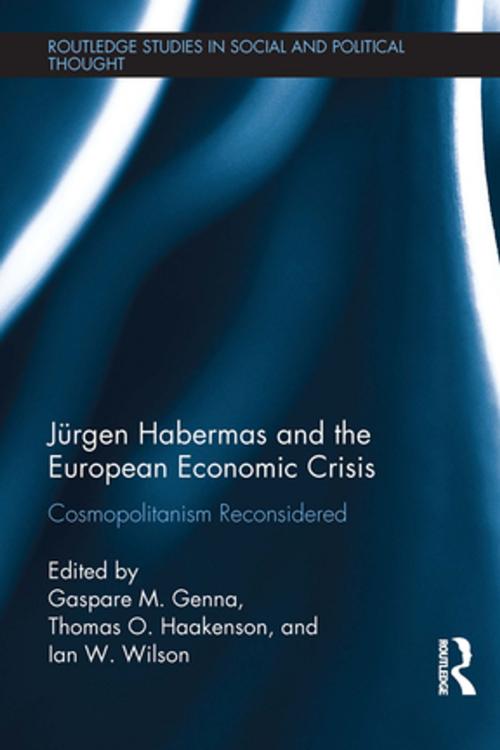Jürgen Habermas and the European Economic Crisis
Cosmopolitanism Reconsidered
Nonfiction, Social & Cultural Studies, Political Science, International| Author: | ISBN: | 9781317288367 | |
| Publisher: | Taylor and Francis | Publication: | May 20, 2016 |
| Imprint: | Routledge | Language: | English |
| Author: | |
| ISBN: | 9781317288367 |
| Publisher: | Taylor and Francis |
| Publication: | May 20, 2016 |
| Imprint: | Routledge |
| Language: | English |
The European Union entered into an economic crisis in late 2009 that was sparked by bank bailouts and led to large, unsustainable, sovereign debt. The crisis was European in scale, but hit some countries in the Eurozone harder than others. Despite the plethora of writings devoted to the economic crisis in Europe, present understandings of how the political decisions would influence the integration project continue to remain vague. What does it actually mean to be European? Is Europe still a collection of peoples that rallied together during good times and then retreat to nationalism when challenges appear? Or has Europe adopted a common identity that would foster solidarity during hard times?
This book provides its reader with a fresh perspective on the importance identity has on the functioning of the European Union as exemplified in Jürgen Habermas’ seminal text, ‘The Crisis of the European Union: A Response’. Rather than exploring the causes of the crisis, the contributors examine the current state of European identity to determine the likelihood of implementing Habermas’ suggestions. The contributor’s interdisciplinary approach is organized into four parts and examines the following key areas of concern:
- Habermas’ arguments, placing them into their historical context.
- To which degree do Europeans share the ideals Habermas describes as crucial to his program of reform.
- Influence of Habermas’ cosmopolitanism through religious and literary lenses.
- Impact of Habermas’ notions in the arenas of education, national economies, austerity, and human rights.
Jürgen Habermas and the European Economic Crisis will be read by scholars in the fields of Political Theory and Philosophy, European Politics and Cultural Studies.
The European Union entered into an economic crisis in late 2009 that was sparked by bank bailouts and led to large, unsustainable, sovereign debt. The crisis was European in scale, but hit some countries in the Eurozone harder than others. Despite the plethora of writings devoted to the economic crisis in Europe, present understandings of how the political decisions would influence the integration project continue to remain vague. What does it actually mean to be European? Is Europe still a collection of peoples that rallied together during good times and then retreat to nationalism when challenges appear? Or has Europe adopted a common identity that would foster solidarity during hard times?
This book provides its reader with a fresh perspective on the importance identity has on the functioning of the European Union as exemplified in Jürgen Habermas’ seminal text, ‘The Crisis of the European Union: A Response’. Rather than exploring the causes of the crisis, the contributors examine the current state of European identity to determine the likelihood of implementing Habermas’ suggestions. The contributor’s interdisciplinary approach is organized into four parts and examines the following key areas of concern:
- Habermas’ arguments, placing them into their historical context.
- To which degree do Europeans share the ideals Habermas describes as crucial to his program of reform.
- Influence of Habermas’ cosmopolitanism through religious and literary lenses.
- Impact of Habermas’ notions in the arenas of education, national economies, austerity, and human rights.
Jürgen Habermas and the European Economic Crisis will be read by scholars in the fields of Political Theory and Philosophy, European Politics and Cultural Studies.















